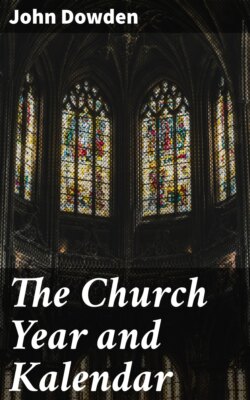Читать книгу The Church Year and Kalendar - John Dowden - Страница 6
На сайте Литреса книга снята с продажи.
The Week and the Lord’s Day.
ОглавлениеTable of Contents
Most potent in affecting the whole daily life of Christendom in all ages was the passing on from Judaism of the Week of seven days. Inwoven, as it is, with the history of our lives, and taken very much as matter of course, as if it were something like a law of nature, the dominating influence and far reaching effects of this seven-day division of time are seldom fully realised.
The Week, known in the Roman world at the time of our Lord only in connexion with the obscure speculations of Eastern astrology, or as a feature, in its Sabbath, of the lives of the widely-spread Jewish settlers in the great cities of the Empire, had been from remote times accepted among various oriental peoples. It would be outside our province to enquire into its origin, though much can be said in favour of the view that it took its rise out of a rough division into four of the lunar month. But, so far as Christianity is concerned, it is enough to know that it was beyond all doubt taken over from the religion of the Hebrews.
It is not improbable that at the outset some of the Christian converts from Judaism may have continued to observe the Jewish Sabbath, the seventh or last day of the week: and that attempts were made to fasten its obligations upon Gentile converts is evident from St Paul’s Epistle to the Colossians (ii. 16). But it is certain that at an early date among Christians the first day of the week was marked by special religious observances. The testimony of the Acts of the Apostles and the Epistles of St Paul shows us the first day of the week as a time for the assembling of Christians for instruction and for worship, when ‘the breaking of bread’ formed part of the service, and when offerings for charitable and religious purposes might be laid up in store[2]. The name ‘the Lord’s day,’ applied to the first day of the week, may probably be traced to New Testament times. The occurrence of the expression in the Revelation of St John (i. 10) has been commonly regarded as a testimony to this application[3].
In the Epistle of Barnabas (tentatively assigned by Bishop Lightfoot to between A.D. 70 and 79, and by others to about A.D. 130-131) we find the passage (c. 15), ‘We keep the eighth day for rejoicing, in the which also Jesus rose from the dead.’ The date of the Teaching of the Apostles is still reckoned by some scholars as sub judice. But, if it is rightly assigned to the first century, its testimony may be cited here. In it is the following passage:—‘On the Lord’s own day (κατὰ κυριακὴν δὲ Κυρίον) gather yourselves together and break bread, and give thanks, first confessing your transgressions, that your sacrifice may be pure’ (c. 14).
The next evidence, in point of time, is a passage in the Epistle of Ignatius to the Magnesians (cc. 8, 9, 10), in which the writer dissuades those to whom he wrote from observing sabbaths (μηκέτι σαββατίζοντες) and urges them to live ‘according to the Lord’s day (κατὰ κυριακὴν) on which our life also rose through Him.’ It is impossible to suppose that in early times the Lord’s day was held to be a day of rest. The work of the servant and labouring class had to be done; and it has been reasonably conjectured that the assemblies of Christians before dawn were to meet the necessities of the situation. Lastly, the passage from the Apology of Justin Martyr (Ap. i. 67) is too well known to be cited in full. He describes to the Emperor the character and procedure of the Christian assemblies on ‘the day of the sun,’ which we know from other sources to have been the first day of the week. Writings of the Apostles or of the Prophets were read: the President of the assembly instructed and exhorted: bread, and wine and water were consecrated and distributed to those present and sent by the Deacons to the absent: alms were collected and deposited with the President for the relief of widows and orphans, the sick and the poor, prisoners and strangers. Later than Justin we need not go, as the evidence from all quarters pours in abundantly to establish the universal observance of ‘the first day of the week,’ ‘Sunday,’ ‘the Lord’s day,’ as a day for worship and religious instruction[4].
